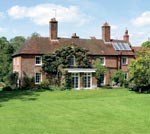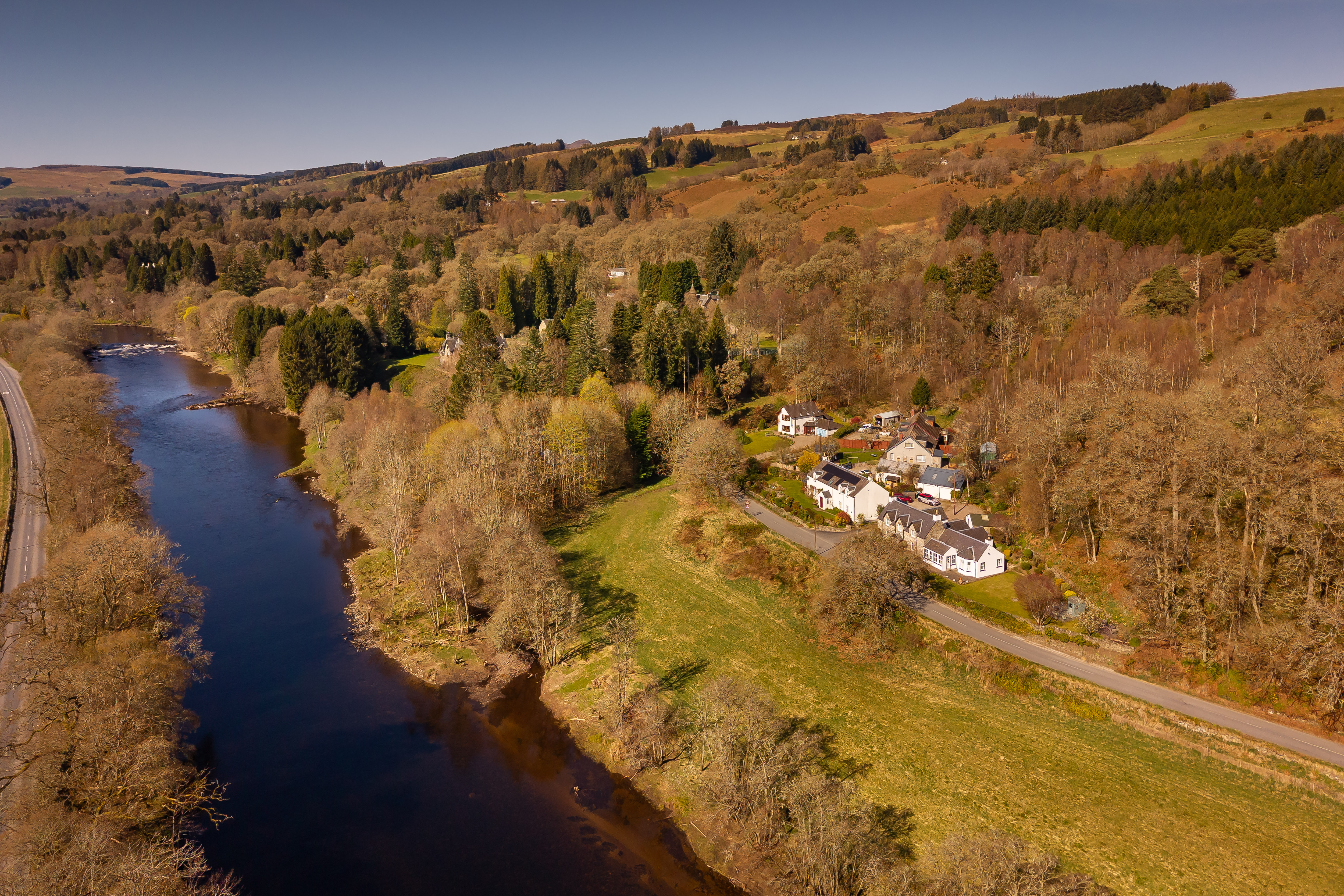Houses with artistic connections
Country houses for sale where the creative arts have flourished – including our own cartoonist's family home, Billingford Hall


Annie Tempest, Country Life's cartoonist-in-residence, Is selling Billingford Hall at Billingford, north Norfolk, her much-loved family home of the past 15 years. Jackson-Stops & Staff (01603 612333) quote a guide price of £1.395 million for the elegant Georgian country house, listed Grade II, with its walled garden, stabling and outbuildings set in 11.5 acres of paddocks and parkland, overlooking open farmland and a series of privately owned lakes, 10 miles south of the Georgian town of Holt. In the 18th century, this was all part of the Earl of Leicester's vast Holkham Estate, much of it a wasteland where 'two rabbits fought for every single blade of grass'. The progressive Thomas Coke, later the second earl, then transformed it into a model farming estate, and it is still one of the most important in Norfolk. Billingford Hall was built by the Holkham Estate in 1750 as a rather grand coaching inn, which was eventually sold off and converted by successive owners into an even grander country house. Annie has completed the picture by restoring the original walled garden, landscaping the grounds, converting the second floor former servants' quarters to a four-room teenage retreat for her children, Freddy and Daisy, and decorating the house throughout in her own, inimitable, light-hearted style. The heart of Billingford Hall is the galleried central reception hall, leading to the beautifully proportioned morning room, drawing room and evening room on one side, and to the dining room and perfect country house kitchen (complete with Aga) on the other. Tucked away at the rear of the house is Annie's studio, which looks out over a trellised terrace to the walled garden, where a hedge hides a vegetable garden and a water garden with willows, flag irises and marsh marigolds. The main first floor rooms have wonderful views of the surrounding fields, the village church and further especially the master bedroom suite, which is huge. There are four more double bedrooms on this floor, as well as a large bathroom and a separate washroom. Norfolk can be breezy, and the sheltered evening terrace on the west side of the house is a great place to sip a sundowner and look out across paddocks and woodland to the protected Roman site on the property's north-west corner, and the lakes beyond. Norfolk's county set has provided Annie with plenty of inspiration for her iconic 'Tottering-by-Gently' series, but this is prime Thelwell country too, and the Hall's stabling and riding facilities will go down a storm with any horse mad youngster who aspires to Pony Club glory. The metamorphosis of historic Lynsted Park at Lynsted, on the southern edge of the North Kent fruit belt, from grand Tudor mansion to classic Georgian country house, was rather more dramatic. The original Lynsted Park was a vast, Elizabethan E-plan house built by Sir John Roper, later Lord Teynham, in 1599. In the early 1800s, however, a lawsuit between two Roper brothers over which should inherit Lynsted Park resulted in the then incumbent, who feared losing the case, demolishing the bulk of the house, leaving only the central portion with its distinctive two storey porch. It was later 'Georgianised' with the addition of large sash windows, but its Elizabethan core can be readily identified from a print of the original house which hangs in the drawing room. In the 1970s, Lynsted Park was the home of the scriptwriter Terry Nation, who created the Daleks for the BBC's Dr Who series, and later devised Blake's Seven. In 1980, he left the UK to try his luck in California, and in 1983, Lynsted Park was bought by Sittingbourne businessman David Ferrett, who has spent his time there restoring the house, removing layers of white pebbledash to reveal the original mellow red brickwork, and planting 6,000 trees in the surrounding 30 acres of parkland. The interior retains much of its Elizabethan origins, notably in the finely carved stairwell, the dining room with its heavily timbered ceiling, and the master bedroom with its original, full height panelling, ornately plastered ceiling and leaded-light windows overlooking the walled gardens and beautifully landscaped grounds. Lynsted Park, listed Grade II*, is a substantial family home with four reception rooms, six first floor bedrooms, three second-floor rooms, and a large kitchen/breakfast room. Now that Mr Ferrett's children have left the nest, it is time to downsize, and secluded Lynsted Park is for sale through Strutt & Parker (01227 451123) at a guide price of £2.5m. The same agents are asking £1.1m for Bessborough House at Fostall, near the popular rural village of Hernhill, midway between Faversham, Canterbury and Whitstable. Here, the quintessential Georgian façade, added in 1790, conceals a much earlier timber framed farmhouse. Bessborough House was in 'a terrible state' when the current vendors, Philip and Caroline Carr, bought it in 1993, and they embarked on a major programme of renovations, which included installing new windows, laying down a new drive and a York stone terrace to the rear of the house, and landscaping the 1.75 acres of garden and grounds. Fourteen years later, the Carrs are ready to move on, leaving behind their handsome Kentish farmhouse with its three reception rooms, seven bedrooms, three bathrooms and self-contained one bedroom annexe. The sale includes an unusual optional extra a 5ft long replica of Bessborough House which was made for their daughter, and is complete in every detail, right down to the wallpaper, the flooring and even some of the pictures.
Sign up for the Country Life Newsletter
Exquisite houses, the beauty of Nature, and how to get the most from your life, straight to your inbox.
Country Life is unlike any other magazine: the only glossy weekly on the newsstand and the only magazine that has been guest-edited by HRH The King not once, but twice. It is a celebration of modern rural life and all its diverse joys and pleasures — that was first published in Queen Victoria's Diamond Jubilee year. Our eclectic mixture of witty and informative content — from the most up-to-date property news and commentary and a coveted glimpse inside some of the UK's best houses and gardens, to gardening, the arts and interior design, written by experts in their field — still cannot be found in print or online, anywhere else.
-
 Vertigo at Victoria Falls, a sunset surrounded by lions and swimming in the Nile: A journey from Cape Town to Cairo
Vertigo at Victoria Falls, a sunset surrounded by lions and swimming in the Nile: A journey from Cape Town to CairoWhy do we travel and who inspires us to do so? Chris Wallace went in search of answers on his own epic journey the length of Africa.
By Christopher Wallace Published
-
 A gorgeous Scottish cottage with contemporary interiors on the bonny banks of the River Tay
A gorgeous Scottish cottage with contemporary interiors on the bonny banks of the River TayCarnliath on the edge of Strathtay is a delightful family home set in sensational scenery.
By James Fisher Published
